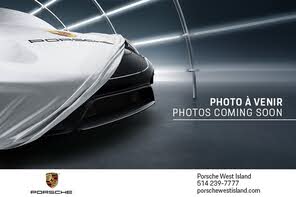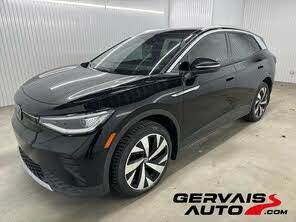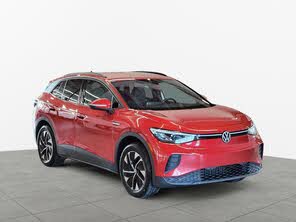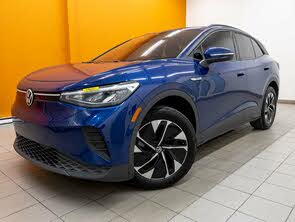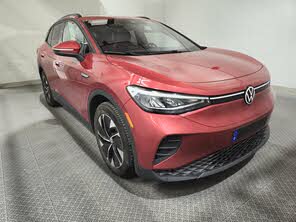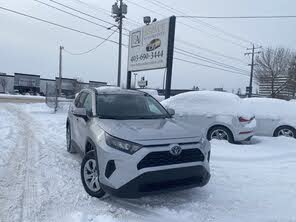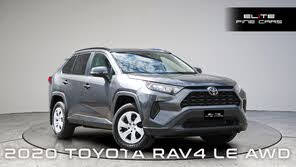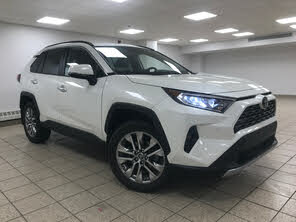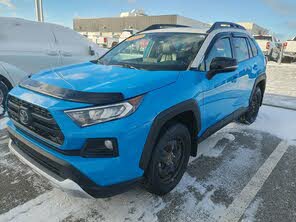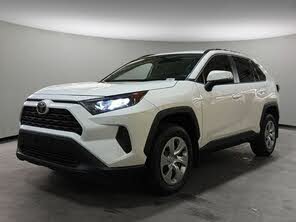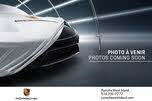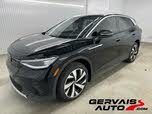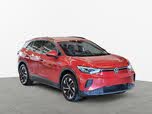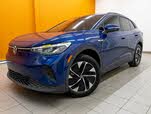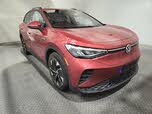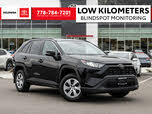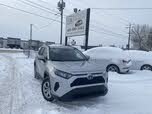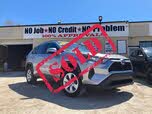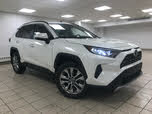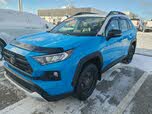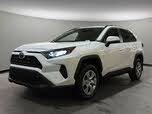2021 Volkswagen ID.4 vs 2020 Toyota RAV4
Overview | |
MSRP$25,950 | MSRP$39,995 |
Average price$31,085 | Average price$34,678 |
Listings180 | Listings5 |
Ratings & Reviews | |
User Reviews | User Reviews |
Expert reviews8.7 out of 10 | Expert reviews7.3 out of 10 |
2020 Toyota RAV4 Reviews SummaryWhen you live with a Toyota RAV4 for a while, it’s easy to understand why so many people buy this Canadian-made SUV. Available with a gasoline four-cylinder engine or a gas-electric hybrid powertrain (covered as a separate model), and in a wide range of configurations including sporty XSE, luxurious Limited, and rugged Trail, the 2020 RAV4 meets a variety of customer wants and needs. | |
2021 Volkswagen ID.4 Reviews SummaryThe “Dieselgate” emissions scandal forced Volkswagen to double down on electric cars, and now we’re finally seeing the first result of that: the 2021 Volkswagen ID.4 electric crossover. VW has made an electric car before, but its last attempt, the e-Golf, was built to satisfy emissions standards, not rack up sales. It was barely advertised, and it was sold only in certain locations. With the ID.4, it will launch in the three largest Canadian EV markets—British Columbia, Quebec, and Ontario—and will even be built in North America, in Chattanooga, Tennessee, starting in 2022. Volkswagen views the ID.4 as a rival not to other EVs, but to mainstream gasoline vehicles like the Honda CR-V and Toyota RAV4. Being late to the party means there are already several other EVs trying to coax new-car buyers away from internal combustion, however. If you want a reasonably priced EV, the Nissan Leaf, Hyundai Kona Electric, and Kia Niro EV already exist, and General Motors has the 2022 Chevrolet Bolt EUV—a new variant of the Chevy Bolt EV with a crossover body style similar to the Volkswagen. Our test car was an ID.4 1st Edition, a U.S.-only model released to commemorates the car’s launch. Its closest Canadian equivalent is the ID.4 RWD Pro with the Statement Package. | |
No video found | |
Popular Features & Specs | |
Engine2.5L 203 hp I4 | Engine201 hp Electric |
Drive TrainFWD | Drive TrainRWD |
Seating Capacity5 | Seating Capacity5 |
EV Battery Capacity | EV Battery Capacity82 kWh |
MPG City27 | MPG City104 |
MPG Highway35 | MPG Highway89 |
Battery Charge Time (240V) | Battery Charge Time (240V)8 hours |
Engine | |
Engine Name2.5L 203 hp I4 | Engine Name201 hp Electric |
Battery Charge Time (240V) | Battery Charge Time (240V)8 hours |
DrivetrainFWD | DrivetrainRWD |
Fuel Economy | |
EV Battery Capacity | EV Battery Capacity82 kWh |
MPG City27 | MPG City104 |
MPG Highway35 | MPG Highway89 |
Interior | |
Seating Capacity5 | Seating Capacity5 |
Safety | |
Front Crash Overall4 | Front Crash Overall5 |
Side Crash Overall5 | Side Crash Overall5 |
Dimensions & Capacity | |
Cargo Space37.6 cu ft | Cargo Space30.3 cu ft |
Curb Weight3370 lbs | Curb Weight4517 lbs |
Height67.0 in | Height64.4 in |
Length180.9 in | Length180.5 in |
Width73.0 in | Width72.9 in |
Wheelbase105.9 in | Wheelbase108.9 in |
Maximum Payload1240 lbs | Maximum Payload1347 lbs |
Number of doors4 | Number of doors4 |
Maximum Towing Capacity1500 lbs | Maximum Towing Capacity |
Overview | ||
MSRP | $25,950 | $39,995 |
Average price | $31,085 | $34,678 |
Listings | ||
Ratings & Reviews | ||
User reviews | ||
Expert reviews | 8.7 out of 10Read full review | 7.3 out of 10Read full review |
Pros & cons | ||
Summary | When you live with a Toyota RAV4 for a while, it’s easy to understand why so many people buy this Canadian-made SUV. Available with a gasoline four-cylinder engine or a gas-electric hybrid powertrain (covered as a separate model), and in a wide range of configurations including sporty XSE, luxurious Limited, and rugged Trail, the 2020 RAV4 meets a variety of customer wants and needs. | The “Dieselgate” emissions scandal forced Volkswagen to double down on electric cars, and now we’re finally seeing the first result of that: the 2021 Volkswagen ID.4 electric crossover. VW has made an electric car before, but its last attempt, the e-Golf, was built to satisfy emissions standards, not rack up sales. It was barely advertised, and it was sold only in certain locations. With the ID.4, it will launch in the three largest Canadian EV markets—British Columbia, Quebec, and Ontario—and will even be built in North America, in Chattanooga, Tennessee, starting in 2022. Volkswagen views the ID.4 as a rival not to other EVs, but to mainstream gasoline vehicles like the Honda CR-V and Toyota RAV4. Being late to the party means there are already several other EVs trying to coax new-car buyers away from internal combustion, however. If you want a reasonably priced EV, the Nissan Leaf, Hyundai Kona Electric, and Kia Niro EV already exist, and General Motors has the 2022 Chevrolet Bolt EUV—a new variant of the Chevy Bolt EV with a crossover body style similar to the Volkswagen. Our test car was an ID.4 1st Edition, a U.S.-only model released to commemorates the car’s launch. Its closest Canadian equivalent is the ID.4 RWD Pro with the Statement Package. |
Video | No video found | |
Popular Features & Specs | ||
Engine | 2.5L 203 hp I4 | 201 hp Electric |
Drive Train | FWD | RWD |
Seating Capacity | 5 | 5 |
EV Battery Capacity | 82 kWh | |
MPG City | 27 | 104 |
MPG Highway | 35 | 89 |
Battery Charge Time (240V) | 8 hours | |
Engine | ||
Engine Name | 2.5L 203 hp I4 | 201 hp Electric |
Battery Charge Time (240V) | 8 hours | |
Drivetrain | FWD | RWD |
Fuel Economy | ||
EV Battery Capacity | 82 kWh | |
MPG City | 27 | 104 |
MPG Highway | 35 | 89 |
Interior | ||
Seating Capacity | 5 | 5 |
Safety | ||
Front Crash Overall | 4 | 5 |
Side Crash Overall | 5 | 5 |
Dimensions & Capacity | ||
Cargo Space | 37.6 cu ft | 30.3 cu ft |
Curb Weight | 3370 lbs | 4517 lbs |
Height | 67.0 in | 64.4 in |
Length | 180.9 in | 180.5 in |
Width | 73.0 in | 72.9 in |
Wheelbase | 105.9 in | 108.9 in |
Maximum Payload | 1240 lbs | 1347 lbs |
Number of doors | 4 | 4 |
Maximum Towing Capacity | 1500 lbs | |

By: CarGurus + AI
At CarGurus, our team of experienced automotive writers remain at the heart of our content operation, conducting hands-on car tests and writing insightful guides that are backed by years of industry experience. To complement this, we are harnessing AI to make our content offering more diverse and more helpful to shoppers than ever. To achieve this, our AI systems are based exclusively on CarGurus content, ratings and data, so that what we produce is both unique to CarGurus, and uniquely helpful to car shoppers.


